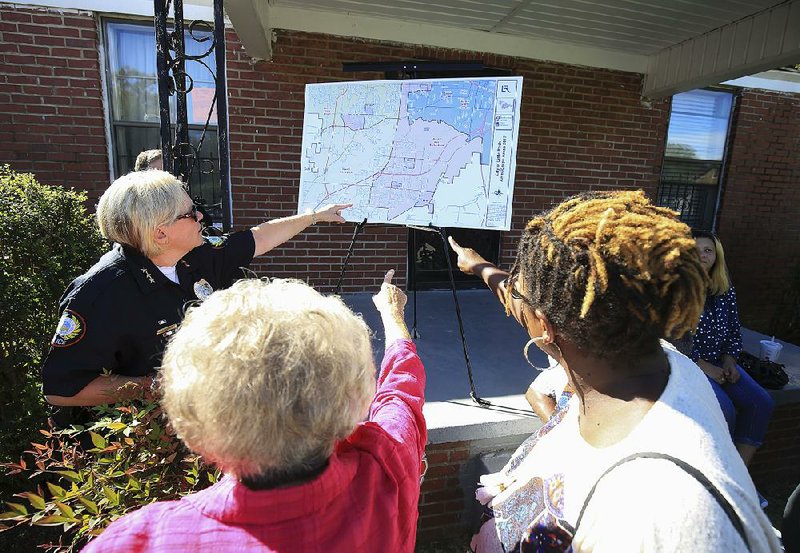Little Rock city leaders are discussing setting aside a chunk of federal housing funds to help people who can't afford to fix their property get out of environmental court.
The city receives between $1.2 million and $1.4 million in U.S. Department of Housing and Urban Development Community Development Block Grant funds each year. At-large City Director Joan Adcock has suggested pulling some of that money, possibly ranging from $40,000 to $50,000, for a trial program to see if more homes could be repaired through designated funding.
Although allocating those funds is legal, HUD regulations would restrict them to a small number of people, according to Victor Turner, director of the city's Housing and Neighborhood Department.
There are about 7,650 cases open in environmental court, some dating as far back as 1994, according to data provided by the Arkansas Administrative Office of the Courts on Thursday. Environmental court hears all city code violations, which range from premise violations like tall grass or trash in the yard to building violations. Building violations include not fixing or demolishing structures deemed unsafe or uninhabitable.
Property owners who go to court for premise violations are not eligible to receive federal funds. Those defendants comprise the majority of people he sees in environmental court, District Judge Mark Leverett said. Most people he sees are also young, able-bodied people who could fix their property but refuse to do so, he said.
But though it may be a relatively small number of defendants who simply can't fix their housing violations, Leverett said fixing those problems is more expensive and time consuming. It could take just a few hours to clean up a premise violation, but doing roof or siding repair on a house takes more time and money.
"Those cases just seem to get in court or stay in court," he said.
Leverett also noted the personal cost of those violations.
"From a human dignity standpoint, it'd be great if they could get into compliance and get out of court," he said. "It has to be a drain on the human spirit to live in a home that doesn't meet code."
Getting more homes into compliance is better for neighborhoods overall -- homes that do not meet code are in danger of becoming abandoned or vacant buildings where criminal activity takes place. Each year, the city demolishes buildings where repairs were not made in a timely fashion.
In a presentation to the Board of Directors on Tuesday, Turner said 223 people have asked the city for help in getting their property up to code over the past year and a half. Of those, 44 were qualified to receive assistance from the department and would have received it last year, Turner said, but funding ran out, so they are still on the waiting list.
Roughly a quarter of those 223 people are return applicants, Turner said, meaning they have asked his department for help more than once. The department assists an average of 104 residents per year, according to Turner.
Just two of those 223 applicants would qualify for federal aid, he said. One HUD regulation requires that the structure that the money goes into be occupied, he said.
That's an issue for defendants who inherit property they don't live in and can't afford to fix up, Leverett said.
HUD funds also can't cover fixing fire damage, Turner said.
For federal money to go into fixing these properties, a program could be set up to allow for what would normally be considered a code enforcement problem to be a correction problem, according to City Attorney Tom Carpenter. Waivers can also be sought so that someone can seek financial help based on their income level, regardless of their age. Typically, federal funding for individual housing help is reserved for people who are 62 or older or disabled, or for neighborhoods where more than half of the residents are below a certain income level.
Turner said there are elderly defendants in environmental court, but most of them have premise violations.
At Tuesday's agenda meeting, city directors aired their frustrations with blight and problem properties in their districts.
Ward 6 City Director Doris Wright said it didn't seem like the current system was working.
"If we have these elderly people continually going to court and they do not have the funds to fix the house, what is the sense of continuing to send them to court when the neighborhood's not going to get any better, the house is not going to be fixed?" Wright said.
Ward 7 City Director B.J. Wyrick expressed similar worries.
"I'm concerned about some of the area, the decline that I'm seeing," Wyrick said. "Environmental court may or may not be the best thing to happen for those people."
Leverett said he was in favor of allocating the funds, but that he realizes the existing financial strain.
"Those funds are so stretched," he said. "There's just a bunch of holes in the boat and you just can't fill them all."
Community Development Block Grants fund other city services beyond housing, including Meals on Wheels and health clinics.
The board is expected to discuss the issue further at its regular meeting at 6 p.m. on Tuesday.
Metro on 08/06/2018
